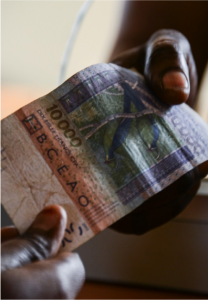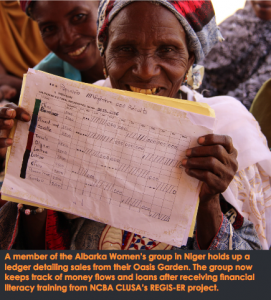 The project will also strengthen DCA Partner Banks, BICIM Mali and Bank of Africa Mali’s capacity and willingness to loan to the agriculture sector, to women entrepreneurs and associations, and to Microfinance Institutions (MFIs) who lend to these two groups throughout the DCA program life.
The project will also strengthen DCA Partner Banks, BICIM Mali and Bank of Africa Mali’s capacity and willingness to loan to the agriculture sector, to women entrepreneurs and associations, and to Microfinance Institutions (MFIs) who lend to these two groups throughout the DCA program life.
NCBA CLUSA’s role is to support the first objective by mentoring and advising loan recipients, especially women entrepreneurs to help grow their operations in the post-loan investment environment. NCBA CLUSA will provide cooperative business development training to farmers and herder groups as an additional service to the loan access.
Accessing Finance
Income and sustainable livelihoods are the centerpiece of NCBA CLUSA’s approach to development. We focus on training, improving governance and linking to markets that build assets and allow producers, entrepreneurs and local cooperatives and businesses to succeed.
 Training up farmers on post-harvest handling and improved farming techniques is only one piece of improving value chains. For many farmers, access to credit and finance makes the difference in being able to access markets and ultimately higher incomes and improved livelihoods.
Training up farmers on post-harvest handling and improved farming techniques is only one piece of improving value chains. For many farmers, access to credit and finance makes the difference in being able to access markets and ultimately higher incomes and improved livelihoods.
NCBA CLUSA builds the capacity of smallholder farmers to use financial products through providing training in functional numeracy and literacy so vulnerable people, particularly women, can access financial services, including savings and credit.
NCBA CLUSA integrates financial literacy and numeracy training into many programs. In Niger and Burkina Faso, our REGIS-ER project has formed over 300 savings and loans groups, many to manage money flows from Oasis Gardens run by women’s groups. NCBA CLUSA has also facilitated nearly $650,000 loans to the agricultural sector (more than half to women). In Mozambique, through our PROMAC project, we are connecting 15,000 smallholder farmers with basic numeracy and literacy centers, and in the past 20 years over 50,000 farmers have graduated from these centers and are now eligible for secondary schooling.
NCBA CLUSA links youth, women and cooperatives to financing through Village Savings and Loan Associations (VSLAs), Savings and Credit Cooperatives (SACCOs), Micro-Finance Institutions (MFIs) and mainstream commercial banks with group lending models allowing the most vulnerable to access financing through group guarantees. Savings is the first step towards economic resilience, creating a buffer during lean periods.

